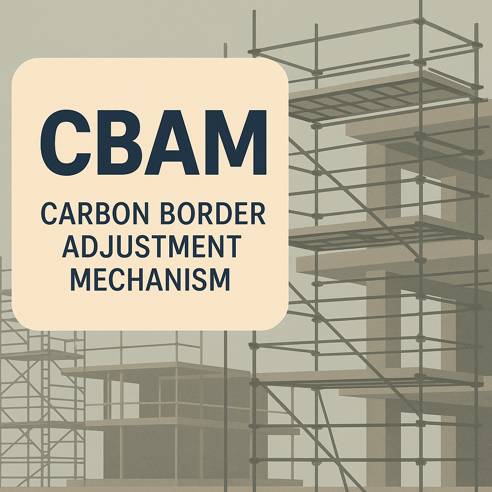What is CBAM?
What is CBAM?
Carbon Border Adjustment Mechanism (CBAM):
Impacts on Turkish Exporters and the Scaffolding Industry
The European Union (EU) is taking significant steps toward its goal of becoming carbon-neutral by 2050 as part of its climate change mitigation strategy. One of the key components of this strategy is the Carbon Border Adjustment Mechanism (CBAM), which aims to level the playing field between EU producers and foreign competitors by imposing a carbon cost on certain imported goods.
CBAM will particularly affect countries like Turkey, which export carbon-intensive products such as steel, aluminum, cement, and fertilizers to the EU. This article explores what CBAM is, how it will be implemented, its potential impact on Turkish exports, and its specific implications for Turkish scaffolding and formwork manufacturers.
What is CBAM?
CBAM is a carbon leakage prevention mechanism under the EU’s "Fit for 55" package. Its primary objectives are:
Protecting EU industries from unfair competition by non-EU producers that do not face carbon pricing.
Encouraging global emissions reduction by incentivizing cleaner production methods outside the EU.
CBAM imposes a carbon cost on imports of selected goods based on their embedded emissions. If a non-EU producer has already paid a carbon price in their home country, this cost will be deducted from the CBAM fee.

CBAM Coverage (Phased Implementation)
Iron and steel
Aluminum
Cement
Fertilizers
Electricity
Hydrogen
The transition period began on October 1, 2023, with full implementation starting in 2026. By 2034, CBAM will be fully integrated with the EU’s Emissions Trading System (ETS).
How Will CBAM Work?
The mechanism operates as follows:
Emissions Reporting: Exporters must document the carbon footprint of their products.
CBAM Certificate Purchase: EU importers must buy CBAM certificates corresponding to the embedded emissions of imported goods. The price will mirror the EU’s carbon market (ETS).
Deduction for Local Carbon Pricing: If the exporting country (e.g., Turkey) has its own carbon tax or ETS, the paid amount will be deducted from the CBAM cost.
CBAM’s Impact on Turkey
Turkey is one of the EU’s largest suppliers, particularly in steel, aluminum, and cement—sectors directly affected by CBAM.
Key Export Sectors at Risk
Steel: Turkey exports around $10 billion worth of steel to the EU annually.
Aluminum: Exports exceed $1.5 billion per year.
Cement: Turkey holds a significant share in the EU market.
According to Turkish Statistical Institute (TÜİK) and Ministry of Trade data, nearly 40% of Turkey’s exports to the EU fall under CBAM-covered sectors. This could lead to substantial cost increases for Turkish industries.
Estimated Additional Costs for Turkish Exporters
Steel: €50–€100 per ton in CBAM costs.
Aluminum: Potentially higher due to energy-intensive production.
Cement: High emissions intensity makes this sector particularly vulnerable.
If Turkey does not implement its own carbon pricing mechanism, these costs will directly burden exporters.
CBAM’s Effect on Scaffolding and Formwork Manufacturers
Turkey is a major supplier of scaffolding and formwork systems to Europe, heavily reliant on steel and aluminum. Therefore, CBAM will significantly impact this sector.
Potential Challenges
Cost Increases: Rising steel and aluminum prices due to CBAM will raise production costs.
Competitiveness Loss: Turkish manufacturers may struggle against competitors from China, India, or Bangladesh if pricing advantages diminish.
Green Transition Pressure: EU buyers will increasingly demand low-carbon production, pushing firms to adopt sustainable practices.
Opportunities for Adaptation
Early adopters of green manufacturing will gain a competitive edge.
Carbon-neutral certifications (EPD, ISO 14064) can enhance market access.
EU green transition funds could support Turkish firms in upgrading production.
How Should Turkey Prepare for CBAM?
Implement a National Carbon Pricing System: A Turkish ETS would reduce CBAM liabilities.
Invest in Clean Production: Shift to renewable energy, hydrogen-based steel, and energy-efficient processes.
Leverage EU Green Deal Support Programs: Utilize grants from KOSGEB and TÜBİTAK.
Sectoral Collaboration: Steel, aluminum, and construction industries should jointly develop decarbonization strategies.
Conclusion and Recommendations
CBAM presents both a risk and an opportunity for Turkish exporters. Scaffolding and formwork manufacturers must prepare for higher material costs but can also position themselves as sustainable suppliers in the EU market.
Key Steps for Turkey:
✔ Align with CBAM reporting requirements
✔ Accelerate the shift to clean energy in heavy industries
✔ Establish a national carbon market
✔ Provide training and financial support for exporters
With the right strategies, CBAM can be transformed from a trade barrier into a catalyst for green industrial growth in Turkey.
References & Further Reading
European Commission CBAM Documentation (2023)
TÜİK Export Data (2023)
Turkish Steel Producers Association Reports
World Bank, "Carbon Pricing for Green Transition" (2022)
ISO, "EU Green Deal and Turkish Industry" (2023)
Our Products
Corporate
Products
© Copyrights Reserved 2026